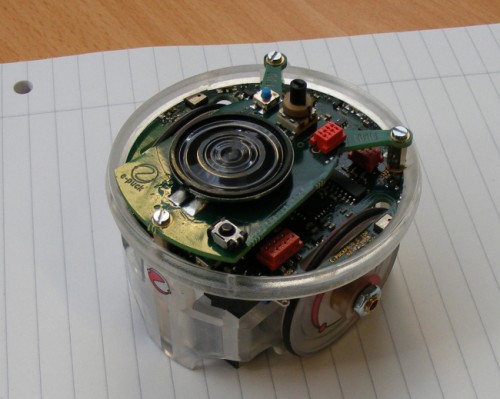Evolutionary swarm robotics
In this research we are working on making the process of evolving a working swarm behaviour faster. In a traditional evolutionary algorithm fitness may be measured many thousands of times, in evolutionary swarm robotics each fitness measure may takes minutes to complete because it must be tested on a physical robot. This makes the process of evolving a robotic swarm very slow.
We aim to test whether giving the swarm robots pre-designed communication actually helps speed up the evolution of the collective behaviour. This works in two ways. Firstly, it limits the number of possible behaviours because they do not have to evolve the communication, meaning that evolutionary algorithm's search space is smaller. Secondly, there is theory[1] to suggest that doing so would make the swarm more stable. Essentially, if the robots know how and what information is being communicated between each other, then they can rely on other robots to provide the information they need and expect. Without pre-determining the robot to robot communication they would not have this ability, a detrimental change to the communication of one robot would cause faults in other robots that rely on the data it provides.
For our experiments we will be using sound as our communication medium and the robots will communicate by playing a series of tones, each tone could consist of several different frequencies. The simulation for this behaviour is being developed in parallel with the implementation on real robots. Currently we have a simulation of phonotaxis (movement towards a sound source) being performed, we are now developing a microphone array beamforming extension to the e-puck so that they can detect what audio in their environment and discern its frequency and the direction the sound is coming from.
Our simulation is written using Player/Stage and will eventually be implemented on the University of York's swarm of 18 e-puck robots. One of the university's swarm robots. This is an E-Puck, an open-source robot designed at the EPFL institute in Switzerland:

Publications
- Jennifer Owen, Susan Stepney, Jon Timmis and Alan Winfield (2010) "Exploiting Loose Horizontal Coupling In Evolutionary Swarm Robotics". In: Swarm Intelligence, 7th International Conference, ANTS 2010. Brussels, Belgium. Lecture Notes in Computer Science vol. 6234. Springer-Verlag. Available from our publications page.
- Jennifer Owen, (2010) "How to Use Player/Stage, 2nd Edition". Published online.
